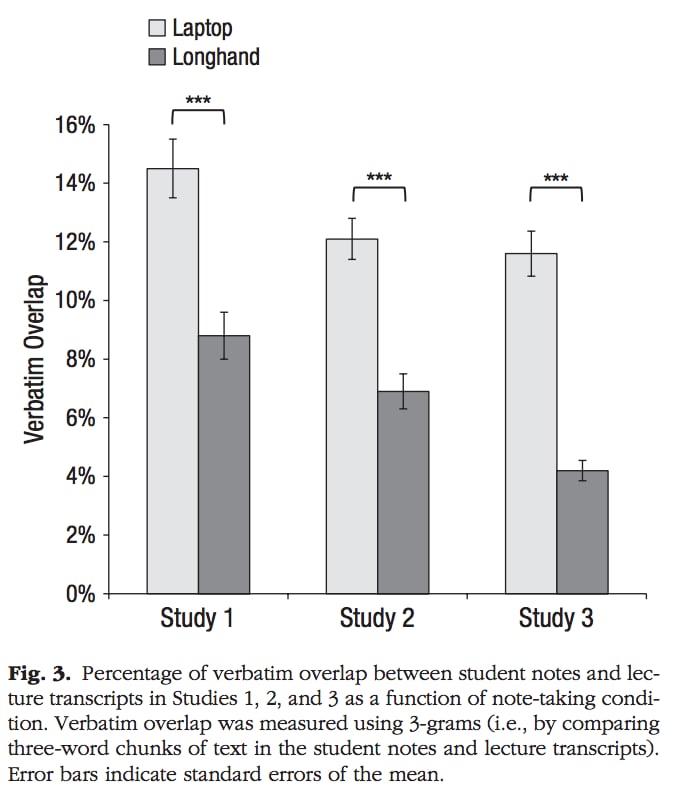Should laptops be banned from meetings?

Image: Helloquence
Using a laptop rather than a pen to take notes in meetings could undermine your performance - and that of your colleagues.
And not just because you're distracted.
When we type rather than write notes, we record information in a very different way, found researchers at Princeton and UCLA.
Laptops enable us to record words much faster than by hand. Therefore when we use them to take notes, we tend to act as a stenographer, recording information as verbatim as we can.
This leads us to skip a crucial step which occurs when we take notes longhand. The slow speed of handwriting demands that we synthesize each point in our head before recording it, in order to phrase it as succinctly as possible. Often, we are not aware we are doing it.
This extra step improves our conceptual understanding of the material presented, researchers concluded, calling it a ‘desirable difficulty towards improved outcomes’.

The psychologists randomly assigned laptops or notebooks to two groups of students and asked them to take notes while watching five TED talks. They tested the students' comprehension afterwards. Those who had used laptops had a significantly lower conceptual understanding than those who had taken notes by hand.
A further group of students were given laptops and warned not to take notes verbatim. They still scored lower. Awareness of note-taking styles did not change outcomes.
The speed of typing means we typically use more words when taking notes on a laptop. Generally, longer notes lead to better understanding. But researchers found that both the lack of information synthesis, and the amount of overlap in material recorded, undermined this trend.

However, the greater volume of notes recorded may help laptop users to recap material better in the future, researchers hypothesized. Participants were asked to review their notes a week after the lectures, before being tested on comprehension. Those who used laptops still scored lower than those who took notes by hand.
Worse, using laptops has an adverse effect on nearby co-workers who are not.

Colleagues who multi-task on their laptops, switching between taking notes and performing irrelevant tasks on the internet, damage others' comprehension, researchers at the York University and McMaster University found.
Students without laptops but who could see classmates on laptops researching information unconnected to the learning topic scored 17% lower on a post-lecture comprehension test than those who could not see multi-tasking colleagues.
Some academics, such as Professor Susan Dynarski, have already banned electronics from their classrooms.
Should companies follow suit and make meetings a laptop-free zone?
It depends on what type of material is being presented during the meeting. For taking notes on factual information which requires low conceptual understanding, such as schedules and logistics, laptops are perfect.
But for meetings in which you need to process and expand on the material presented, you serve yourself and your colleagues best by using a pen and paper.
As well as helping your comprehension, leaving your laptop behind could improve your interactions too.
“I realized people assumed when I was typing on my laptop that I was texting or Slack-ing", wrote journalist Kim Bui.
"Now I only bring my phone and notebook unless I’m presenting something. It signals that I am all in, totally present and relieves me of distractions.”
Don't miss any update on this topic
Create a free account and access your personalized content collection with our latest publications and analyses.
License and Republishing
World Economic Forum articles may be republished in accordance with the Creative Commons Attribution-NonCommercial-NoDerivatives 4.0 International Public License, and in accordance with our Terms of Use.
The views expressed in this article are those of the author alone and not the World Economic Forum.
Stay up to date:
Future of Work
Forum Stories newsletter
Bringing you weekly curated insights and analysis on the global issues that matter.
More on Jobs and the Future of WorkSee all
Till Leopold
November 14, 2025






